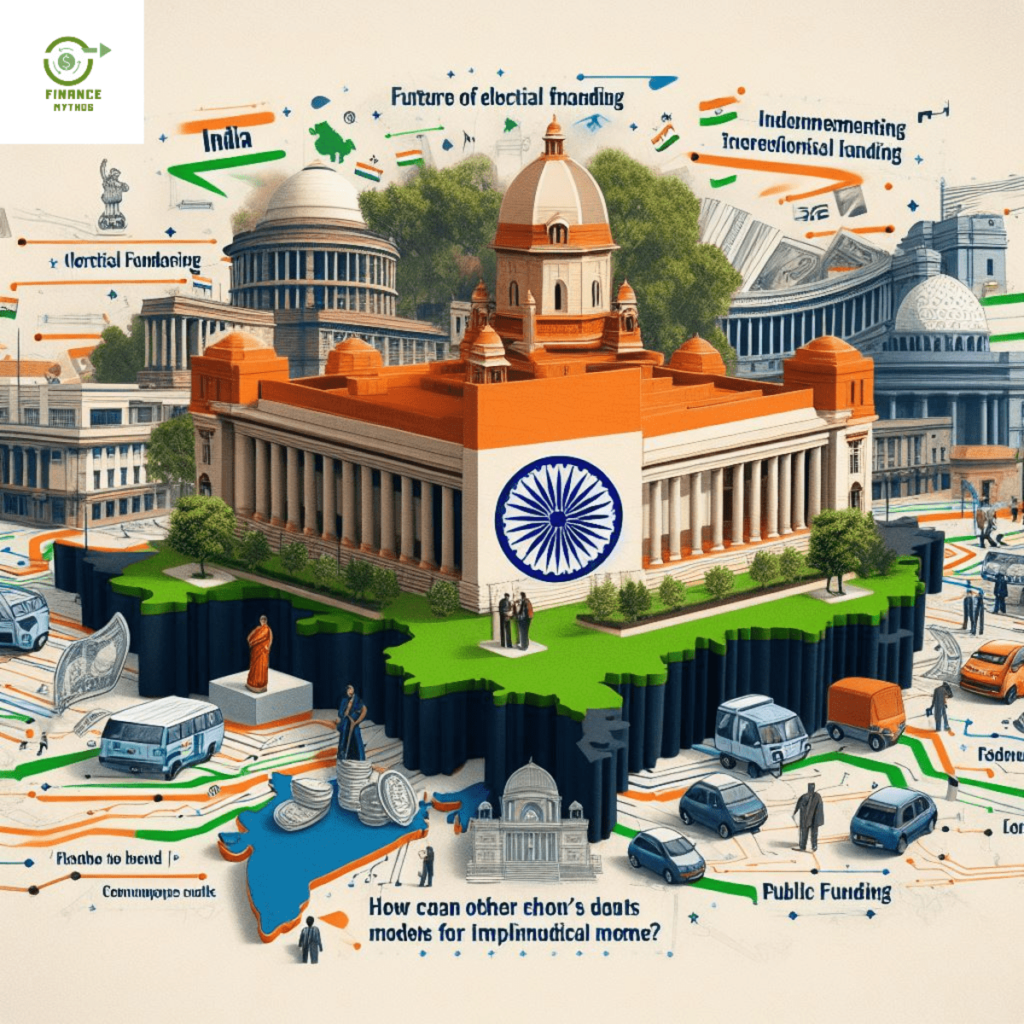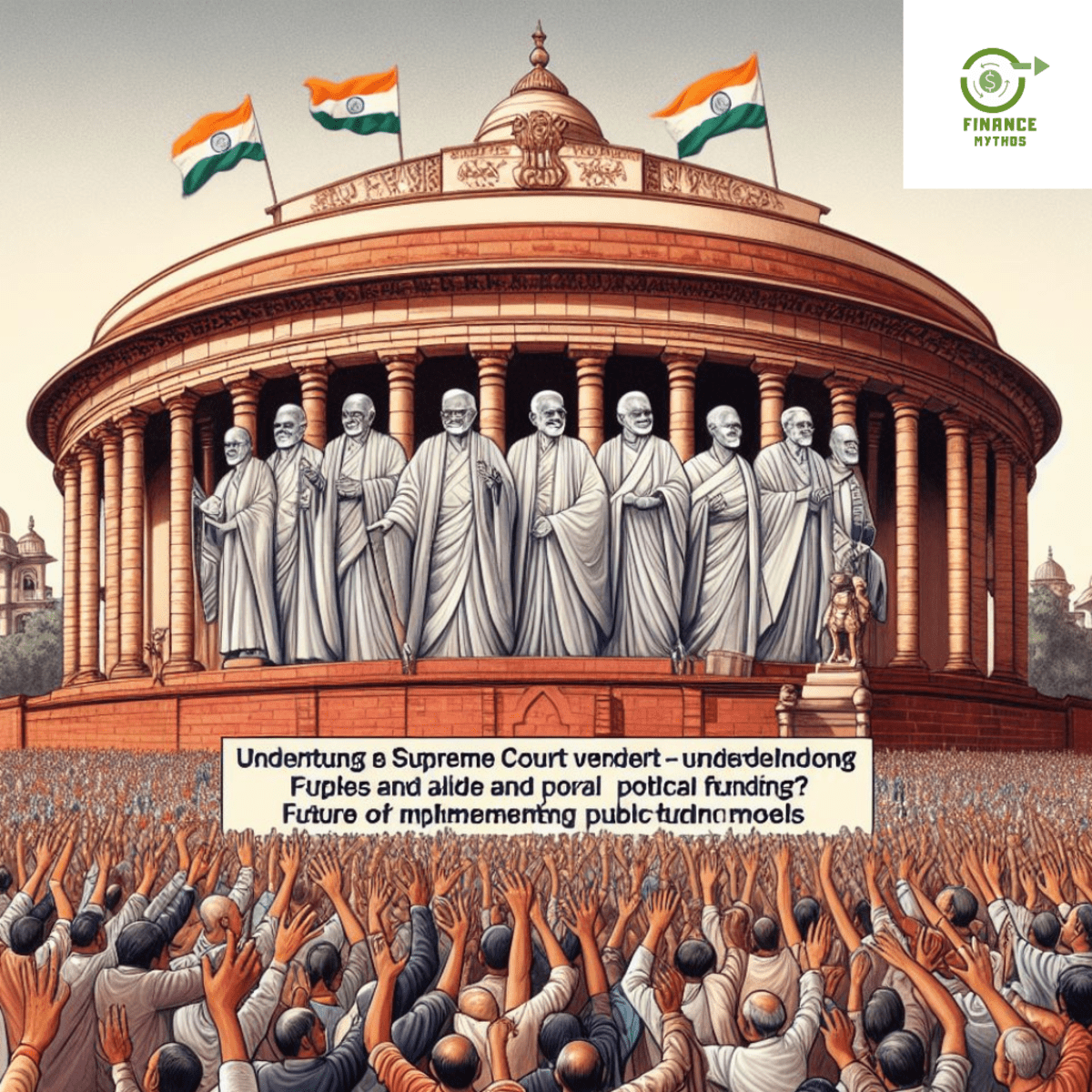Electoral Bonds are financial instruments introduced by the Indian government in 2018 to facilitate political funding. Here’s a concise overview:
Table of Contents
TogglePurpose and Introduction of Electoral Bonds:
- The NDA government introduced electoral bonds with the aim of replacing cash donations and enhancing transparency in political funding.
- These bonds function as promissory notes or bearer bonds and are issued by the State Bank of India (SBI).
- Individuals and companies can purchase these bonds exclusively for contributing funds to political parties.
Features Electoral Bonds:
- Available in denominations of Rs 1,000, Rs 10,000, Rs 1 lakh, Rs 10 lakh, and Rs 1 crore.
- Issued during specific 10-day periods in January, April, July, and October, as announced by the government.
Significance of Electoral Bonds in Indian Politics:
- Electoral bonds were intended to increase transparency in political donations.
- However, critics argue that the anonymity provided by the scheme fosters corruption and disrupts the level playing field among political parties.
- The scheme has been a contentious method of funding and has faced scrutiny since its inception.

Recent Supreme Court Verdict on Electoral Bonds:
- In a landmark decision, the Supreme Court declared the electoral bonds scheme “unconstitutional”.
- The court directed the SBI to cease issuing electoral bonds immediately.
- SBI must provide the Election Commission of India (ECI) with detailed records of all electoral bond contributions received by political parties from the scheme’s inception until now.
- The ECI will publish this information on its official website, ensuring transparency and public access.
The verdict sends a strong message against the use of black money in politics and elections, advocating for alternative measures to ensure transparency and accountability in political funding.
Impact of the Supreme Court Decision on Electoral Bonds:
- The court declared the electoral bonds scheme unconstitutional.
- Key implications:
- Transparency: The verdict emphasizes the importance of transparency in political funding.
- Right to Information: The scheme was found to violate citizens’ right to information.
- Disclosure: The court ordered disclosure of purchasers’ names, bond values, and recipient details.
- The decision could significantly alter the landscape of political financing in India.
Possibilities on future of Political Funding in India considering Supreme Court Verdict
- National Electoral Fund:
- Create a fund where all donors contribute, and allocations are based on parties’ vote share.
- Protects donor identities while ensuring proportional distribution.
- Reduces black money in political funding.
- National Electoral Fund:
- Continual Monitoring:
- Regular judicial scrutiny, periodic reviews, and public engagement.
- Adapt to emerging concerns and maintain an inclusive decision-making process.
- Continual Monitoring:
Future of Electoral Bonds:
- Challenges Ahead:
- The verdict highlights flaws in the electoral bonds system.
- Ensuring transparency without reverting to a cash-only system is crucial.
- Debate Continues:
- Supporters argue for secure, confidential funding channels.
- Critics emphasize the need for full disclosure and accountability.
- Evolution Expected:
- India may explore hybrid models combining transparency and privacy.
- Striking the right balance will be critical for fair political funding.
- Challenges Ahead:
What are some other countries' models for political funding?

Let’s explore various models for political funding from around the world. Different countries adopt diverse approaches to regulate political financing. Here are some notable examples:
Germany:
- Germany provides public funding to political parties based on their electoral performance.
- Parties receive financial support proportional to their vote share in elections.
- This system encourages parties to engage with voters and ensures a level playing field.
Israel:
- Israel offers public funding to parties based on their representation in the Knesset (parliament).
- Donations from individuals and corporations are subject to limits.
- The system aims to reduce the influence of wealthy donors.
Canada:
- Canada has a mix of public funding and private donations.
- Parties receive per-vote subsidies and can also raise funds from supporters.
- Stringent disclosure rules ensure transparency.
Sweden:
- Sweden combines public funding with strict spending limits.
- Parties receive state subsidies, and individual donations are capped.
- Transparency is emphasized, and parties must disclose their finances.
France:
- France provides public funding to parties based on their electoral performance.
- Donations from corporations are banned, and individual contributions are capped.
- Parties must disclose their finances regularly.
Japan:
- Japan has a public funding system where parties receive subsidies.
- Individual donations are limited, and corporate contributions are prohibited.
- Transparency and accountability are key principles.
Mexico:
- Mexico combines public funding with matching funds.
- Parties receive state subsidies, and private donations are matched by the government.
- Disclosure requirements enhance transparency.
Netherlands:
- The Netherlands provides public funding to parties based on their parliamentary representation.
- Donations from corporations are restricted, and individual contributions are capped.
- Regular audits ensure financial accountability.
Poland:
- Poland offers public funding to parties based on their electoral results.
- Donations from corporations and foreign entities are prohibited.
- Parties must disclose their finances to the public.
These examples demonstrate that there is no one-size-fits-all solution, but each country strives to strike a balance between donor privacy, transparency, and democratic integrity. The future of electoral financing will likely continue to evolve as societies seek better ways to fund political processes.
How can India learn from other countries' experiences for political funding ?
India can draw valuable lessons from other countries’ experiences in political funding. Let’s explore some key insights:
Public Funding Models:
- Countries like Germany and the UK have successfully implemented public subsidies and direct funding for political parties.
- Germany allocates state subsidies based on parties’ electoral performance, reducing reliance on interested money.
- UK targets state subsidies effectively, enhancing transparency in electoral politics.
Contextual Understanding:
- India should study the effectiveness of different public funding models.
- Understand the reform ecosystems and variations in implementation.
- Context matters, so India must adapt relevant practices to its unique political landscape.
Reducing Illicit Financing:
- India faces challenges due to black money infiltrating its democratic processes.
- Learning from other countries, India can explore direct public funding, which reduces dependence on questionable sources.
- Transparency and accountability are critical components.
Combining Approaches:
- India need not replicate any single model entirely.
- A hybrid approach, combining elements of different systems, may work best.
- Striking a balance between donor privacy and transparency is essential.
Ongoing Learning:
- Regularly assess the impact of reforms.
- Monitor implementation and adapt as needed.
- Public discourse and public participation are crucial for informed decision-making.
In summary, India can learn from global experiences by studying various funding models, contextualizing reforms, and prioritizing transparency and accountability in its electoral financing system.
What are some challenges in implementing public funding models?
Implementing public funding models for political campaigns comes with several challenges. Let’s explore some of these practical hurdles:
Determining Eligibility Criteria:
- Defining clear criteria for political parties and candidates to qualify for state funding can be complex.
- Balancing inclusivity with effective utilization of public resources is a challenge.
Equitable Distribution of Funds:
- Ensuring that funds are distributed fairly among parties and candidates is crucial.
- Avoiding bias or favoritism while allocating resources can be difficult.
Effective Monitoring Mechanisms:
- Rigorous oversight is necessary to prevent misuse of state funds.
- Establishing robust monitoring systems to track fund utilization and compliance is challenging.
Efficiency and Accountability:
- Critics argue that state-funded initiatives may lack efficiency and accountability compared to private funding.
- Public institutions might not always manage funds as effectively as private donors.
Balancing Privacy and Transparency:
- Striking the right balance between donor privacy and transparency is tricky.
- While transparency is essential, protecting donors’ identities is also important.
Political Resistance and Implementation Challenges:
- Political parties may resist changes that affect their existing funding mechanisms.
- Implementing reforms requires political will and consensus.
In summary, implementing public funding models involves navigating these challenges to enhance transparency and fairness in electoral processes.

Jugaad on Two Wheels: The Hilarious Bike Parcel Hack in Karnataka
The Great Karnataka Bike Parcel Hack: A Jugaad Masterclass #RapidoParcel: In a creative yet controversial move, ride-hailing platform Rapido has found a way around Karnataka’s

Denmark’s Digital Sovereignty Revolution: Linux and LibreOffice Lead the Way
Introduction to Denmark’s Bold Move In June 2025, Denmark’s Ministry of Digital Affairs made headlines by embracing digital sovereignty, ditching Microsoft Windows and Office 365

🏏Sports as a Business Strategy: Insights from Vijay Mallya’s RCB Ownership
🧠 Sports as a Business Strategy (Tool) In modern business, few platforms offer better engagement and emotional connection than sports. From football clubs in Europe

🙏 Apologies in Leadership: Vijay Mallya Public Apology
🧠 Introduction: The Role of Apologies in Leadership In the corporate world, apologies aren’t signs of weakness—they’re strategic acts of leadership. When made with sincerity

Audiobook Production Costs: Navigating Recording Artists, Studio Expenses, and AI’s Impact
The audiobook industry is booming, with over 130 million listeners in the U.S. alone in 2021 and a growing global appetite for audio content. Producing

Media Trial of Vijay Mallya: How Public Perception Shaped Vijay Mallya’s Legacy
Introduction: Media’s Influence on Business Narratives In today’s hyper-connected world, media narratives can make or break a business reputation. For Vijay Mallya, once known as

